7 essential tips for choosing the right donation cause

Donating to charities can be a source of unmatched happiness and fulfillment for many. There are several charities that promise a better quality of life with life-altering benefits. People across borders can find organizations that can use donations for a better world. However, the world of charitable organizations is also littered with names out there to scam people for their good deeds. To ensure your efforts are being used rightly, follow these key points.
Do pick the one you believe in
It is okay if you do not agree with how a charity functions or if you prefer it given to the community differently. Some might even have issues with how the organization operates. However, that does not need to hinder your goals or desire to help. If trying to find a suitable option is not appealing, speak to people who have been associated with different charities and discover what about the organization resonates with them. Also, you can get in touch with the organization if you trust the other person enough and commit to them.
Don’t forget registrations
One of the most common mistakes anyone can make when thinking of charitable acts is skipping basic checks. While researching the cause, eligibility, and other things about the charity, keep an eye out for their registrations. It is one of the easiest ways of verifying the authenticity of the organization. It will also tell you if the organization is representing things correctly or not. Do your due diligence before going deeper into your search for the right charitable team. However, different states have varied requirements, which may mean you will have to may have to filter out the research based on your state. You can also ask questions about the funds the charity has received and how they have used the funds over a period of time.
Do check eligibility
You might have a particular figure or subject in mind that you want to donate, but that might not always work. Some charities come with strict criteria that you have to abide by to make donations. These donation requirements are necessary for organizations as they have to follow a process to generate revenue from the proceedings. If your donated item is out of their acceptable list, you might be making a donation that would take away both of your time. If you are unsure, speak to a representative at the charity. Most places make it easy to verify whether your donations fall within the list. You might even be able to find this data on their website.
Don’t feel pressurized
It is okay for organizations to ask if you are planning on donating to their cause when you visit them. It might take you more than one meeting to make up your mind. However, if you feel pressured by the people to donate, it may be a major red flag. In some places, volunteers who seek donations get commissions from the place they are working. Not only is it a poor tactic, but it also is a clear indication that a significant amount of your donation will be going to the people that are running the organization instead of the people it is being run for. Instead of succumbing to the pressure, tell them that you have yet to consider your options before you are sure about the commitment being asked of you.
Do get personal
Getting personal with a charitable organization can offer you much better insight than most online research could deliver. If you are considering a charity, you can easily visit, why not make the most of the situation? Try volunteering, speaking to the staff, or having a meeting with one or more of the charity board members. Volunteering will also provide knowledge of how things are planned, operated, and executed in a charity organization. You can channel this knowledge and even put in your suggestions if there is anything to share.
Don’t just follow the branding
Nowadays, people know what good branding tactics and presence can do for them. So don’t be lured by the sleek logos, functional websites, and professional quality of the advertisements being run by the charity. Robust marketing is increasingly common among organizations to bring in people who want to be associated with their brand. These efforts are made in good faith, but that is not the only thing you should be looking at when weighing the pros and cons of donating to the charity. The charity could be masking its poor records and performance behind the pretty packaging of an effective branding strategy. Rove your eye beyond the professional image and dive deeper into their performance to make an informed choice.
Do maintain records
It might not be the first thing you think about when you decide to be a donor to charities. But it is essential to know that your donations are a source of tax deductions and can offer you some relief. However, to be offered access to the benefit, you would want to maintain a thorough record of the proceedings. Things like card statements, bank statements, canceled cheques against cash donations, and even acknowledgment from charitable organizations are considered in the written form. There might be more requirements if you donate more than a certain amount. For larger sums of donations, donors are required to have a receipt from the organization stating that there have been no gifts or services rendered against the donation received. The IRS tends to cross-check the value of your non-money donations in order to assess that the values have not been overstated.
These important tips will help you make the most of your donations.





